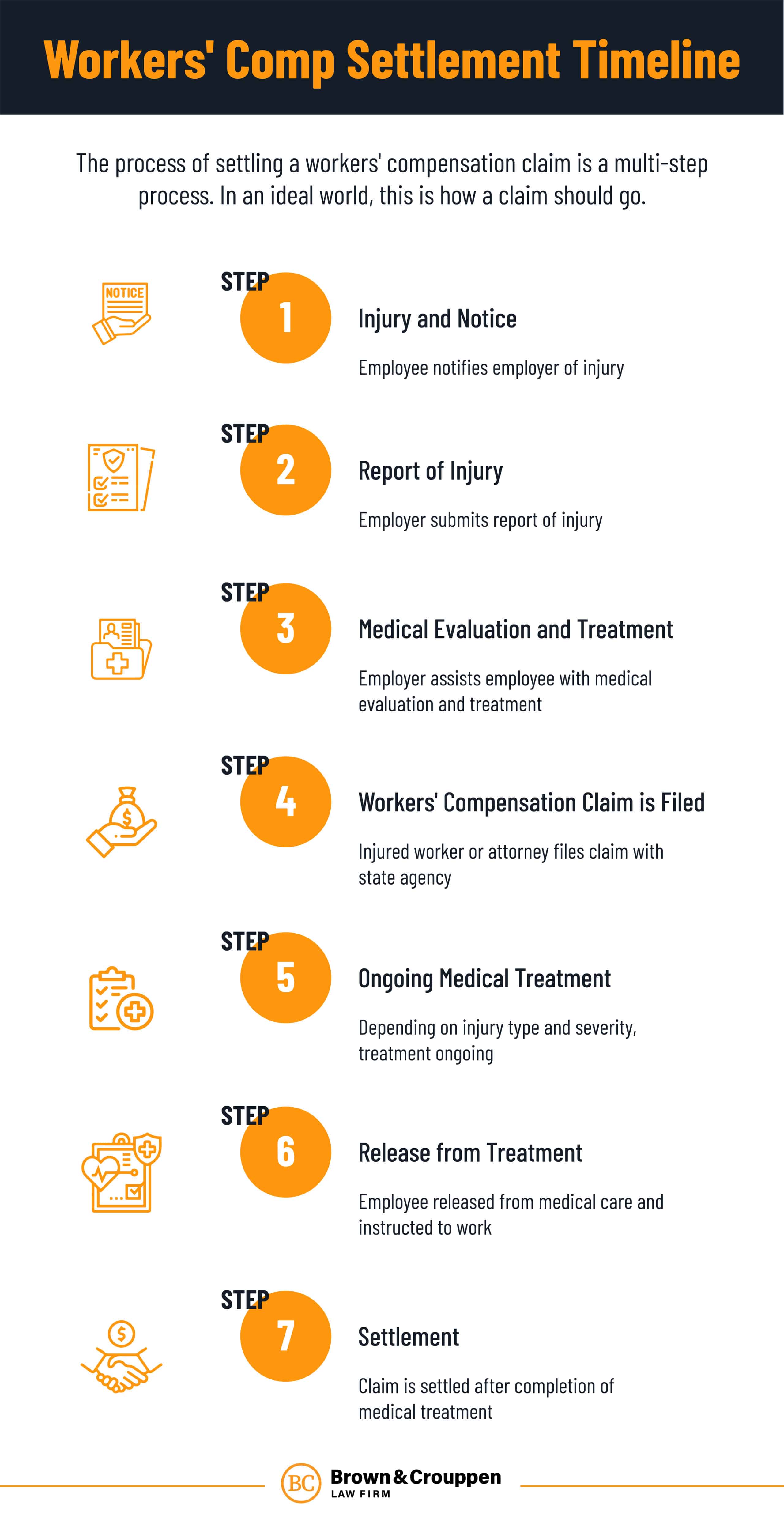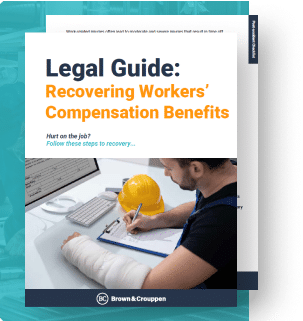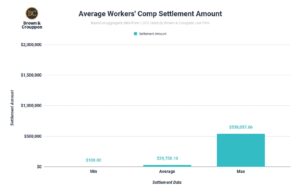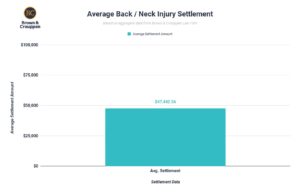When Will Workers' Comp Offer a Settlement?
Workers’ compensation may offer a settlement after your medical condition stabilizes and you reach maximum medical improvement (MMI). At this point, the insurer evaluates the extent of your injuries and long-term disability to determine a fair amount. The timing varies but often occurs once all necessary information is available to calculate your benefits.
- Variables and delays: Variables that can impact or delay a workers’ comp settlement include the severity of your injuries, how long it takes to reach maximum medical improvement (MMI), and disputes over the extent of your disability or required medical treatments. Other factors include insurer negotiations, legal challenges, or waiting for medical or vocational evaluations to determine your benefits.
- How an attorney can help: A workers’ comp attorney helps by ensuring you receive the full benefits you’re entitled to, including medical care and lost wages. They handle complex paperwork, negotiate with insurers, and can represent you in disputes or appeals if your claim is denied. Their expertise maximizes your chances of a fair settlement or award. For help with your case, request a free case evaluation online from our legal team.
Workers’ Comp Settlement Timeline & Claim Overview

The workers’ comp claim process is a multi-step process. In an ideal world, this is how a claim should go.
Step 1: Injury and notice – When an employee gets hurt at work, the employee must notify the supervisor of the injury, including the details of where and how it happened. This is called “notice.” In the state of Missouri, the statute of limitations for workers’ compensation is 2 years, meaning that a claim must be filed within two years of the work injury or death. Additionally, employees must report their injuries to their employer within 30 days of the injury or when the work injuries were discovered.
Step 2: Report of injury – After receiving notice of the workplace injury, the employer is required by law to submit a Report of Injury to the Division of Workers’’ Compensation.
- The Report of Injury is not a workers’ compensation claim for the employee. It is only the employer notifying the state that an injury occurred.
- The employer should also report the injury to its workers’ compensation insurance company.
Step 3: Medical evaluation and treatment – After receiving notice, the employer should also refer the injured worker for a medical evaluation and treatment.
Step 4: Workers’ compensation claim is filed – The injured worker (or, more typically, their attorney) files the Claim for Compensation with the appropriate state agency. For Missouri workers’ compensation cases, this means the Division of Workers’ Compensation. In Illinois, it’s the Illinois Workers’ Compensation Commission.
Step 5: Ongoing medical treatment – Work comp injuries run the gamut from muscle strains and torn ligaments to shattered bones, brain trauma and internal injuries. Each injury has its own regimen, which means treatment can last from weeks to years, depending on type and severity. In most cases, injured workers’ have little say in choosing the medical provider. Workers’ compensation laws give employers and workers’ compensation companies a great deal of control over which providers and what type of treatment the injured worker will receive. If an injury prevents an employee from being able to work at all, the employer will pay for some portion of lost wages, i.e., “work comp pay.” Frequently, injured workers’ are placed on restricted duty, which means they continue to work and receive their payroll.
Step 6: Release from treatment – Eventually, the workers’ compensation doctor releases the employee from medical care, and instructs the employee to work at full, unrestricted duty. If everything has mostly gone right, the claim moves into the Settlement phase. If not, it moves into the hardship phase.
Step 7: Settlement – If the employer has accepted the claim, provided the necessary medical treatment, paid the work comp pay, accommodated the light duty and there is no issue about any permanent disability to the worker, the settlement process is fairly straight-forward. Claims can be settled in as little as 6 months after medical treatment has concluded.
Hardship phase: If the employee is still injured, believes more treatment is needed, or has other difficulties that make settlement premature. This leads us into our next section.

Use our guide to make a full recovery, understand the workers’ comp process, and learn about key legal considerations regarding your claim.
Factors That Impact The Timeline Of A Workers’ Comp Settlement
Common reasons for delay in a workers’ comp settlement include:
Factor 1 – The Employee
If the employee does not vigorously follow up with their boss about the injury and need for treatment, the process is not just delayed. In many cases, it may never start at all. It is not uncommon for injured workers’ to wait months – even a year or more – for their employer to do something before they contact a lawyer (see Section 3).
Factor 2 – The Employer
If the supervisor fails to file a report of injury or to send the employee out for treatment, chances are pretty good the employer also failed to notify the workers’ compensation insurance company.
Factor 3 – Denied Claims
An initial denial is commonly based on one or more defenses.
- Some defenses, such as a lack of notice or the existence of a pre-existing condition, can often be overcome.
- Other defenses can be more problematic. If the employer denies that the injury is work-related, the expected timeframe for settlement shifts from the 6-month range to a year or longer. It is not uncommon for very complicated and highly contested claims to stretch on for years.
It cannot be stressed enough that anytime an employee’s claim is denied, a workers’ comp lawyer is required.
Other Factors
- Life happens – Employees sometimes have unrelated health or family issues that effectively put the claim on hold while those problems are addressed.
- A new injury happens – If an employee has a new workers’ compensation injury and another claim needs to be filed, the first claim will be put on hold while the entire process for the second claim moves forward.
- Workers’ compensation cases are designed to be slow – Dockets move slowly. Getting records and reports can take a long time. Even simple matters take a while, and complicated issues take even longer.
- Communication with the other side does not happen – As slow as the workers’ compensation system is designed to be, it will grind to a glacial pace if the employer, its insurance adjuster, and/or their attorney just don’t respond. It often takes months to get a response from the insurer.
How A Lawyer Can Help With A Workers’ Comp Case
An experienced workers’ compensation attorney knows how to handle the problems (the delays, the denials, the mistreatment) as they arise. Hiring one is the best way for an injured worker to protect themselves and their rights.
- Representing the injured in court – The judge is a lawyer (or former lawyer.) The employer has an attorney. You should have one, too. If you decide, instead, to go pro se (to represent yourself) the judge cannot act as your advocate or give advice, beyond advising the employee to consult an attorney. Moreover, the offered settlement will often be “pennies on the dollar” compared to the payout of a workers’ comp settlement an experienced lawyer can obtain for you.
- Knowing how and when to bring evidence before the judge – Often, the biggest issue in a workers’ compensation claim is the extent of any permanent injuries. The employer is highly motivated to find as little permanent damage as possible. Why? Because less damage means a lower settlement.
Our workers’ compensation attorneys know how to counter a medical report which might be biased in favor of the employer’s bottom line instead of the employee’s actual injuries.


Were you injured in an accident due to someone else’s negligence? Get legal help from the most effective injury law firm in the Midwest.
Get The Workers’ Compensation Settlement You Deserve By Requesting A Free Case Evaluation
Brown & Crouppen serves clients in Missouri, Kansas, and southern Illinois. Our workers’ compensation attorneys have 10 convenient office locations throughout the Midwest including offices in Kansas City and St. Louis. If you or a loved one has been injured while on the job, get help from the attorneys at Brown & Crouppen Law Firm. Our lawyers have helped recover over $1 billion for our clients, including those that suffered injuries while on the job.
Every workers’ compensation client at Brown & Crouppen gets an experienced legal team of lawyers and paralegals dedicated to the practice of workers’ compensation law. If you have been hurt at work, and you want a free, confidential consultation, call toll free at 1-888-803-1307 or request a free case evaluation online. And remember, there’s no upfront cost to you — if you don’t get paid, we don’t get paid.






